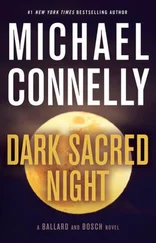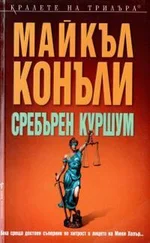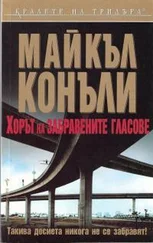“What evidence do you have that this letter was ever mailed or delivered directly to Mr. Scales?”
“I assume it was mailed or delivered. How else would Mr. Haller expect to get paid?”
“Do you have any evidence that Mr. Scales ever received this letter?”
“Again, no. But that is not what is important about the letter.”
“Then, what is important about the letter?”
“Mr. Haller says he knows that Sam Scales kept a fund to pay his lawyer and he wanted another seventy-five thousand. That is motive to kill.”
“Do you suppose that Mr. Haller knew about the fund because Sam Scales told him?”
“That would make sense.”
“Did Sam Scales reveal to Mr. Haller where he kept that fund and how to access it?”
“I have no idea, but it would be covered under attorney-client privilege.”
“If you can’t show that Mickey Haller knows where Sam Scales kept his money, how can you claim that he killed Sam Scales for his money?”
Berg had had enough and stood.
“I object, Your Honor,” she said. “This isn’t voir dire. Ms. Aronson is conducting a discovery deposition.”
“I can see what she is doing, Ms. Berg,” Warfield said. “And she has made her point. Anything further, Ms. Aronson?”
Jennifer checked me and I gave a slight shake of my head, reminding her that a lawyer should always quit talking when she’s ahead.
“No further questions at this time, Your Honor,” she said. “It is clear from the detective’s testimony as well as the document that it was not signed or written by Mr. Haller and has no relevancy to this hearing.”
“Judge, the relevancy is clear,” Berg countered. “Whether or not it was signed by the defendant, it was sent by his office and it references a meeting he attended. It is clearly relevant because it speaks to the issues and motives surrounding this crime — that the defendant was owed money and knew that Sam Scales, the victim, had the money and wouldn’t part with it. We have further documentation we are ready to present that shows the defendant filed a lien against the victim in furtherance of collecting his money. That lien is now lodged against the estate. If money is found, the defendant is in line to receive it, plus interest. He could not get Sam Scales to pay him in life — he hopes to collect from him in death.”
“Objection!” Jennifer yelled.
“Ms. Berg, you know better,” Warfield said. “Leave your sound bites for the reporters, not this court.”
“Yes, Your Honor,” Berg said, her tone falsely contrite.
The judge dismissed Drucker from the witness stand. I knew it was fruitless. The judge would either be canny and object to what the prosecution was doing or let it slide. Warfield asked if there was any further argument and Berg demurred while Jennifer asked to address the court.
“Thank you, Your Honor,” she said. “The court noted earlier that it has wide discretion over bail. The bail schedule is meant to protect the community as well as ensure that defendants accused of crimes are held to answer. To these points, I believe it is clear that Michael Haller is neither a threat to the community nor a threat to flee. He has been free on bond now for six weeks and he hasn’t attempted to flee. He hasn’t threatened the community or anyone associated with this case. In fact, he has sought and received the court’s permission to leave the county and state and yet returned the same night. Your Honor, you do have discretion in the matter and it is in pursuit of a fair trial in this case that I ask that bond be carried over from the original charge and that Mr. Haller be allowed to remain free to defend himself.”
Berg’s comeback was only to remind the judge that rules were rules. She said judicial discretion did not extend to the findings of a grand jury or to the legislature’s decision to make murder for financial gain a no-bail charge.
She then sat down.
I didn’t think we had a winning argument, but the judge built anticipation in the courtroom as she wrote notes before speaking.
“We’ll hear the other motion before I make a decision on this matter,” she said. “We are going to take a ten-minute break first and then we’ll consider Mr. Haller’s six-eight-six motion. Thank you.”
The judge quickly left the bench. And I was left with ten minutes to figure out how to turn things around.
It might have been my last chance to walk the halls of the courthouse, even ride the elevator down and step outside to enjoy a few moments of free, fresh air, but I remained at the defense table during the ten-minute break, which actually lasted twenty. I wanted to be alone with my thoughts. I even told Jennifer I didn’t want her next to me when court resumed. She might have been hurt, but she understood my reasoning. It was me against the state, and while I would not be speaking to a jury, I wanted the judge to be reminded of the fact that I was one man standing alone against the power and might of the beast.
I composed myself to be ready at the ten-minute mark and then dealt with the anxiety of waiting in overtime. Finally Warfield came out and retook her position on the bench above everyone.
“Very well, back on the record,” she said. “We have a motion from the defense to compel a speedy trial. Mr. Haller, I see you are now alone at the defense table. You will be arguing this motion?”
I stood up.
“Yes, Your Honor,” I said.
“Very well,” Warfield said. “I hope we can be succinct. Proceed.”
“If it please the court, I will be succinct. What the prosecution has done with its grand jury indictment is attempt to subvert the law and my constitutionally guaranteed right to a speedy trial. It’s a shell game, Your Honor, played by the prosecution not in the furtherance of justice but in the gaming of it. There have been two constants since the very first minutes of this case. One is that I have steadfastly denied these charges and claimed my innocence. The other is my refusal under any circumstances to delay these proceedings for any amount of time.”
I paused for a moment and looked down at the notes I had scribbled on my legal pad. I didn’t need them. I was on a roll. But I wanted the space so the judge could take in my argument in pieces.
“Since day one I have demanded my right to a speedy trial,” I continued. “I have said put up or shut up to the state. I did not commit this crime and I demand my day in court. And as that day has drawn closer and the prosecution knows it’s almost time, they have blinked. They know their case is weak. They know it is full of holes. They know I have innocence and reasonable doubt on my side and they have attempted to thwart my defense at every turn.”
I paused again, this time turning slightly to look back at my daughter and offer a wistful smile. No man should have his daughter see him in this position.
I turned back.
“Judge, every lawyer’s got a bag of tricks — prosecutor, defense attorney, doesn’t matter. There is nothing pure about the law when you get inside a courtroom. It’s a bare-knuckle fight and each side uses whatever it can to bludgeon the other. The constitution guarantees me a speedy trial, but by dropping the original charge and talking a grand jury into a new one, the prosecution is trying to bludgeon me in two ways: stick me in a jail cell so I am handicapped in preparing my defense, and restart the game clock so the state has more time to wield its power and might and shore up their losing case against me.”
This time I kept my eyes on the judge as I paused before the windup.
“Is it legal? Is it within code? Perhaps. I’ll give them that. But is it fair? Is it in the pursuit of justice? Not a chance. You can stick me back in jail, you can delay the search for truth that a trial is supposed to be, but it won’t be the right thing to do and it won’t be fair. The court holds a lot of discretion in this regard and the defense urges you not to restart the clock. Let’s get to the search for the truth now instead of later, instead of at the prosecution’s convenience. Thank you, Your Honor.”
Читать дальше
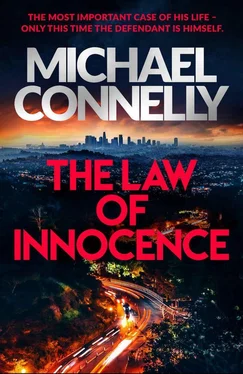

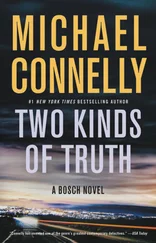


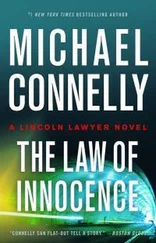

![Майкл Коннелли - The Night Fire [Harry Bosch - 22]](/books/405630/majkl-konnelli-the-night-fire-harry-bosch-22-thumb.webp)
